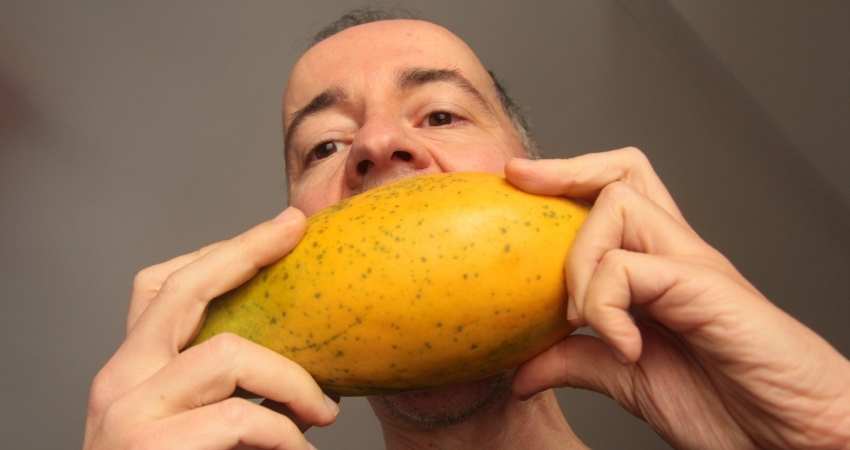Will Mango Make You Fat? Mango Myths & Facts Revealed
A mango will not make you fat because it contains roughly 120 to 180 calories per mango depending on its size. Although mangoes contain a lot of sugar, it’s natural and not the unhealthy added sugars found in processed foods.
If mango is consumed in moderation, it will not solely make you gain weight. If it is consumed as an alternative to unhealthy food, it can help you lose weight.
Mangoes are not bad for you and contain many beneficial nutrients, especially vitamin C, vitamin A and fiber.
As a Certified Health Coach many people ask me about consuming, fruit, mango and losing weight. Today we are going to take a look at and answer a few questions that commonly get asked about Mangoes.

Will Mangoes make you fat?
A single mango contains 135 calories and when it’s consumed in moderation mangoes solely will not make you fat. Depending on the size of a mango, it contains between 30 and 46 g of sugar. Although this is a larger amount compared to other fruit, it’s natural sugar and not the refined, added sugar found in processed foods.
Some people like to point out that a single mango can contain 30 to 46g of sugar depending on its size1. We must remember though, the sugar is natural fructose, glucose, and sucrose sugars. It is not refined2.
Are Mangoes bad for you?
Mangoes are not bad for you and contain many nutrients beneficial to your health. They contain a sizeable percentage of vitamin C, Vitamin A and fiber. Although mangoes contain a lot of sugar, it’s natural and not the unwholesome added sugars found in processed foods.
The nutrients (percentage of daily value – DV) contained in one Mango:
- Vitamin A: 32% DV
- Vitamin C: 96% DV
- Vitamin E: 12% DV
- Vitamin K: 11% DV
- Vitamin B6: 14% DV
- Copper: 11% DV
- Fiber: 15% DV
Although mangos are nutritious and have benefits3, consuming too much may lead to health problems for some.
Eating too many Mangoes can be a problem for people with certain pre-existing conditions. If you have diabetes or any blood sugar-related diseases, it is best to speak to your doctor about including Mangoes in your diet.
A study that was conducted on people with pre-diabetes has shown that consuming 10g of freeze-dried mango can have positive effects. They noticed an increase in insulin levels and a decrease in glucose levels. The test subjects were ordered to eat 10g every day for 12 weeks4.

Can you gain weight from eating fruit?
If fruit is consumed in moderation, it will not solely make you gain weight. All fruit have a higher percentage of carbohydrates and natural sugar than some other foods but are healthy. Fruit contains many vitamins, minerals and antioxidants which can provide you with health benefits. If fruit is consumed as an alternative to unhealthy food, it can help you lose weight.
Although eating natural fruit in moderation won’t make you gain weight5, consuming fruit in excess can make you gain weight. As with anything in life, you need to eat fruit with moderation.
In my experience, one to two servings of fruit a day is more than enough. I frequently add fruit to my daily smoothies. Some of my favorite fruits include:
- Strawberries
- Blueberries
- Kiwi
- Avocado
- Pomegranate
For a complete list of the healthiest fruit, with science to back it up, check my blog post by clicking here, 22 Best Anti-Aging Fruits for Looking & Feeling Younger.
Is Mango good for fat loss?
Mango is good for fat loss when consumed in moderation. Each mango contains only about 130 calories depending on its size. In addition, mangoes contain antioxidants, vitamins and minerals which can benefit losing weight. Consuming mangoes as an alternative to high calorie snacks can help reduce calories and lose fat.
Let’s take a quick look at the answer. If you were to eat a Mango instead of a sandwich, you would be eating healthier food with a lower calorie count. So, if you replace some of the unhealthy processed foods we eat with a nutritious Mango6, it can lead to weight loss.
Let’s be more realistic and assume that you, like most people, eat at least one snack a day in between meals. The average calorie count for our snacks can be around 200 to 500 calories. Replacing that snack with a Mango or almost any fruit for that matter will have a positive impact on your body.
Always consult with a physician prior to starting any exercise program or change in daily nutrition.

Is Mango fattening at night?
Having a Mango at night before bed may not good for weight loss7. Adding any calories higher in sugar into your body before bed may make it harder to lose weight or affect your sleep.
Some say that Mangoes assist our sleeping patterns and make us sleep better at night. Some cultures actually swear by this. You may not have the answer to this question until you ask your physician, experiment and find out how it affects your body.
When to eat Mango to lose weight?
It’s best to eat Mangoes in the morning for breakfast or in the afternoon to lose weight. It could also be consumed in between breakfast and lunch or lunch and dinner. Mangoes should not be consumed at night because of its high natural sugar content.
I like the idea of eating Mangoes for breakfast as it is a low-calorie healthy food. The sugar also serves as a great energy source to get you through the morning until lunchtime.
If you have any questions to ask me about this article don’t hesitate to comment below or email us. You can find an email on our contact page.
Read Next
Worms in Your Farm-Raised Salmon? Facts & Myths Revealed
22 Best Anti-Aging Fruits for Looking & Feeling Younger
These Are the Mushrooms With the Most Protein
- NutritionData: Mangos [↩]
- National Center for Biotechnology Information: Naturally occurring and added sugar in relation to macronutrient intake and food consumption: results from a population-based study in adults [↩]
- National Center for Biotechnology Information: Multifaceted Health Benefits of Mangifera indica L. (Mango) [↩]
- The FASEB Journal: The Effect of Mango Supplementation on Clinical Parameters of Pre-Diabetic Individuals [↩]
- National Center for Biotechnology Information: Paradoxical Effects of Fruit on Obesity [↩]
- USDA: Mangos [↩]
- The National Center for Biotechnology Information: The Health Impact of Nighttime Eating: Old and New Perspectives [↩]
